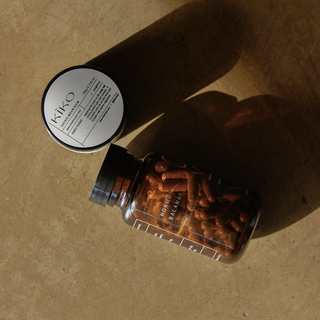
Perimenopause is a transitional phase for women, typically beginning in their early 40s but sometimes as early as the mid-30s. During this stage, the body starts preparing for menopause, leading to significant hormonal changes that can impact energy, mood, metabolism, and overall health. While these fluctuations are natural, they can be managed through a balanced, nutrient-dense diet. Focusing on foods that support hormonal balance can help ease symptoms, promote wellness, and support your body's natural changes during perimenopause.
Understanding Perimenopause and Hormonal Changes
Perimenopause is a period of hormonal transition when estrogen, progesterone, and other hormone levels fluctuate as a woman approaches menopause. Common symptoms of perimenopause include:
- Hot flashes and night sweats
- Mood swings
- Irregular periods
- Sleep disturbances
- Weight gain
- Lower libido
- Fatigue
These symptoms are influenced largely by changing levels of estrogen and progesterone, two hormones that play critical roles in regulating the menstrual cycle and maintaining overall health. As these hormone levels become erratic, addressing diet and lifestyle becomes essential in managing symptoms and supporting a smoother transition.
Why Nutrition Matters During Perimenopause
Nutrition is a powerful tool to support the body during perimenopause. Certain nutrients and foods have shown benefits for hormonal balance, energy regulation, bone health, and emotional well-being. Eating well can help reduce perimenopausal symptoms, support metabolism, and improve overall health.
Nutrients like phytoestrogens, omega-3 fatty acids, fibre, and certain vitamins and minerals support hormonal health and can help maintain energy levels, regulate mood, and improve sleep quality. Proper nutrition also helps manage weight and reduce inflammation, both of which can mitigate perimenopausal symptoms.
Key Nutrients for Hormonal Balance
The following nutrients are particularly beneficial during perimenopause:
- Phytoestrogens
Plant-based compounds that mimic estrogen in the body, potentially helping balance estrogen levels.
- Omega-3 Fatty Acids
Essential fats that reduce inflammation and support brain health.
- Fibre
Supports digestion and promotes a healthy gut microbiome, which is linked to hormonal health.
- Vitamin D and Calcium
Important for bone health, as estrogen levels drop and bone density can decline.
- B Vitamins
Essential for energy metabolism, mood regulation, and stress management.
- Magnesium
Helps with mood stabilisation, sleep quality, and muscle relaxation.

Best Foods for Hormonal Balance During Perimenopause
Incorporating specific foods into your diet can make a big difference in how you feel. Here are some of the top foods for supporting hormonal health during perimenopause:
- Flaxseeds
Flaxseeds are a rich source of lignans, a type of phytoestrogen that can help balance estrogen levels. They’re also high in fibre, promoting healthy digestion and reducing constipation.
How to use: Add a tablespoon of ground flaxseeds to smoothies, oatmeal, or yoghurt.
- Leafy Greens
Leafy greens like spinach, kale, and Swiss chard provide essential nutrients like magnesium, calcium, and B vitamins. Magnesium in particular can help with sleep and reduce muscle cramps.
How to use: Include leafy greens in salads, smoothies, and stir-fries.
- Fatty Fish
Salmon, sardines, and mackerel are high in omega-3 fatty acids, which are anti-inflammatory and help support brain and heart health. They also stabilise mood and reduce the risk of depression.
How to use: Aim for two servings of fatty fish per week, either grilled, baked, or in salads.
- Legumes
Beans, lentils, and chickpeas are excellent sources of protein, fibre, and phytoestrogens. They provide a steady source of energy and can help balance blood sugar levels.
How to use: Use legumes in soups, stews, or salads for a plant-based protein boost.
- Berries
Berries like strawberries, blueberries, and raspberries are rich in antioxidants and fiber. Antioxidants combat oxidative stress, which can worsen perimenopausal symptoms.
How to use: Add berries to breakfast bowls, yoghurt, or enjoy them as a snack.
- Nuts and Seeds
Nuts and seeds are packed with healthy fats, fibre, and magnesium. Walnuts, chia seeds, and pumpkin seeds are especially beneficial for hormone balance.
How to use: Sprinkle nuts and seeds on salads, yoghurt, or eat as a snack.
- Fermented Foods
Foods like yogurt, kefir, sauerkraut, and kimchi promote gut health. A healthy gut microbiome is linked to better hormone regulation and can help reduce bloating and digestive discomfort.
How to use: Include a serving of fermented foods daily to support gut health.
-
Whole Grains
Quinoa, brown rice, and oats are high in fibre and B vitamins, which help regulate mood and energy. They also support blood sugar balance, reducing cravings and mood swings.
How to use: Swap refined grains for whole grains in meals for sustained energy.
Supplementation During Perimenopause
While your health starts with what’s on your plate, there are certain natural supplements that you can take to support your body and mind during this transitional phase. The Kiko Menopause Balance can be as helpful in maintaining your natural hormonal balance during Perimenopause as in Menopause.

Foods to Limit or Avoid
While certain foods can help with hormonal balance, others can exacerbate symptoms. Here are some foods to consume in moderation:
- Refined Sugars and Carbohydrates
These cause blood sugar spikes and crashes, worsening mood swings and fatigue.
- Alcohol
Alcohol can disrupt sleep, worsen hot flashes, and impact liver health, which is essential for hormone processing.
- Caffeine
Caffeine can interfere with sleep and exacerbate anxiety or hot flashes.
- Processed Foods
These often contain unhealthy fats, high salt levels, and artificial additives, all of which can worsen inflammation and hormonal imbalances.
- High-Sodium Foods
Sodium can increase bloating and blood pressure, which can worsen perimenopausal symptoms.
Sample Meal Plan for Perimenopause
Here’s a simple meal plan designed to support hormonal health:
- Breakfast
Overnight oats with chia seeds, berries, and a sprinkle of ground flaxseed
- Lunch
Salad with mixed greens, grilled salmon, avocado, cherry tomatoes, and a vinaigrette
- Snack
Handful of walnuts and a piece of fruit
- Dinner
Stir-fried tofu with broccoli, red bell pepper, and quinoa
- Dessert
Greek yoghurt with a drizzle of honey and a sprinkle of pumpkin seeds
This meal plan incorporates phytoestrogens, omega-3s, and fibre to promote satiety and balance blood sugar levels throughout the day.
Lifestyle Tips to Support Hormonal Health
In addition to nutrition, certain lifestyle changes can enhance hormonal balance and improve well-being during perimenopause:
- Exercise Regularly
Incorporate a mix of strength training, cardio, and flexibility exercises to support bone health, reduce stress, and improve sleep.
- Manage Stress
High stress can worsen hormonal imbalances. Practise mindfulness, meditation, or deep breathing exercises to relax.
- Prioritise Sleep
Sleep is crucial for hormone regulation. Establish a bedtime routine, limit screen time before bed, and create a restful sleep environment.
- Stay Hydrated
Drinking enough water helps flush out toxins, supports digestion, and reduces bloating.
- Get Regular Check-ups
Consult with a healthcare provider to track hormone levels and discuss options for managing symptoms.
Final Thoughts on Nutrition and Perimenopause
Perimenopause is a natural phase of life that can be challenging but manageable with the right nutrition and lifestyle habits. By focusing on whole foods, essential nutrients, and self-care, you can support your body and reduce the impact of perimenopausal symptoms. Remember, small changes can make a big difference - start by incorporating one or two new habits at a time to create a sustainable approach to your health.



